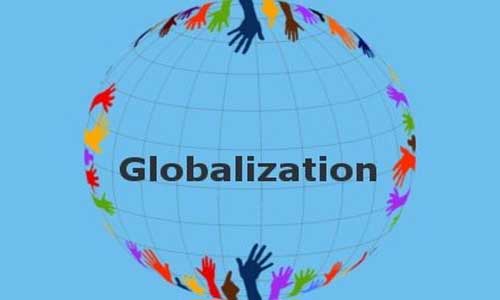Globalization is one of the most controversial topics whereby there is no consensus about its concept and content. According to Martin Albrow, globalization is a process which let the world people live in single society while others have described it in a negative sense saying globalization is not internationalization; it is not liberalizatsion; it is not multi-nationalization; it is not westernalization or a western project or it is not globalism but the most accepted definition is to say globalization is deterritorialization because the territory of cultures, economy, media, social affairs and so forth are gradually reduced as result of globalization. Overall, globalization is a fact which has affected everything including economy, culture, human rights, health, media, education, family, art and more importantly politics. In regard to politics, there is no more absolute definition about concept of national sovereignty as the global states are becoming more interdependent.
In Muslim countries, including Afghanistan, globalization raised a lot of questions and discussions. Based on rightist approach, globalization is a natural and historic process which created a lot of positive changes and opportunities across the world. It has paved the way for advent of new players such as international organization, multinational companies and even international figures. The new players, besides propelling the world towards peace and cooperation, they also spread human rights and international standard across the globe. In today’s world, if the negative phenomena such as war, terrorism, drug trafficking and so on, survive in one part of the world such as Afghanistan, the entire universe can be affected. Based on rightist approach, we must embrace all international values and standards without any conditions and limitations.
Based on leftist approach, globalization is a western project and even it is equated to Americanization. Therefore, they warn about its unpleasant consequences and outcome in the future. In Muslim countries, the extremist groups such as Taliban, Al-Qaeda, Daesh and Salafist groups can be classified under this category. According to their positions, here seems a natural hostility between Islam and globalization values and achievements. Sometimes it is heard that they broke the product of new technologies such as T.V, Dash, and computer and so on as they are the produced by western society. Similarly, they oppose democracy, internal values, and humanitarian values without any rational reasons.
The leftist and rightist oppositions about globalization are one of the several factors which causes a lot of socio-cultural gaps and divisions among the people in third world countries. In Afghanistan, some of the religious groups blame technocrats as westernized people who have no deep understanding about local culture and spiritual life. On the other hand, the modernist people called traditionalists as resilient and ignorant factors that play a hindering role against modernization and development. If we look at social media networks, there are many examples which resemble these gaps and divisions between various classes of the people.
Meanwhile, there are a third group of people who are more flexible and moderate regarding globalization issues in the country. Based on this approach, nothing is absolutely black and white unless it crosses from the filter and standard of rationality. Neither the unconditional prescription of westernized individuals can solve the problem of the country and nor the dogmatic approach of extremists groups as both have narrow-minded mentality about the world either black or white. Afghanistan, as a multi-cultural and multi-ethnic country, needs to more flexible and pluralistic approach. We must differentiate between superstitious phenomena and pure local or cultural values. Similarly, we need to be respectful against modern human achievement, globalization values. If we are not able to listen to one and other, and if we have no tolerance to listen each and other, it will have very destructive consequences.
Fortunately, the modern constitution of Afghanistan has a very moderate and cooperative approach against globalization values; from one hand it has recognized the international human rights and values and on the other hand it pays respect to all culture and religion. It neither resemble a natural hostility between eastern and western values and nor local values. That’s why; it is called one of the best constitutions in the region. If we look at moderate approach in new developing countries such as Turkey, Iran, and India and so on, they face with a similar approach. Neither they neither unconditionally welcome everything nor blindly ignore everything. In fact, they face globalization with more cooperative approach, not confrontation approach. Based on scientific studies which carried out in China, Japan, Hong Kung, India and Iran all traditions and local values do not necessary prevent from social and political development. In a very pessimistic view, if we cannot accept its positive role, we cannot prove its negative impact in the mentioned countries.
All in all, neither we can deprive our country from blessing of globalization and nor unconditionally accept everything under name of globalization or modernization. As abovementioned, the modern constitution of Afghanistan has a very moderate and cooperative approach against globalization and it has provided a good foundation for advancement of the country provided that the processes are not postponed by extremist elements. The Afghan thinkers, writers, media workers and more importantly the Afghan civil society members should not let the country go back to the dark era. This is high time that civil society groups open their eyes and not let its government alone. Thus, the political parties have very sensitive responsibilities in direction and management of public opinion when there is a fear of going back to the dark era.
Home » Opinion » What is Globalization: A Project or a Process?
What is Globalization: A Project or a Process?
| Mohammad Zahir Akbari

